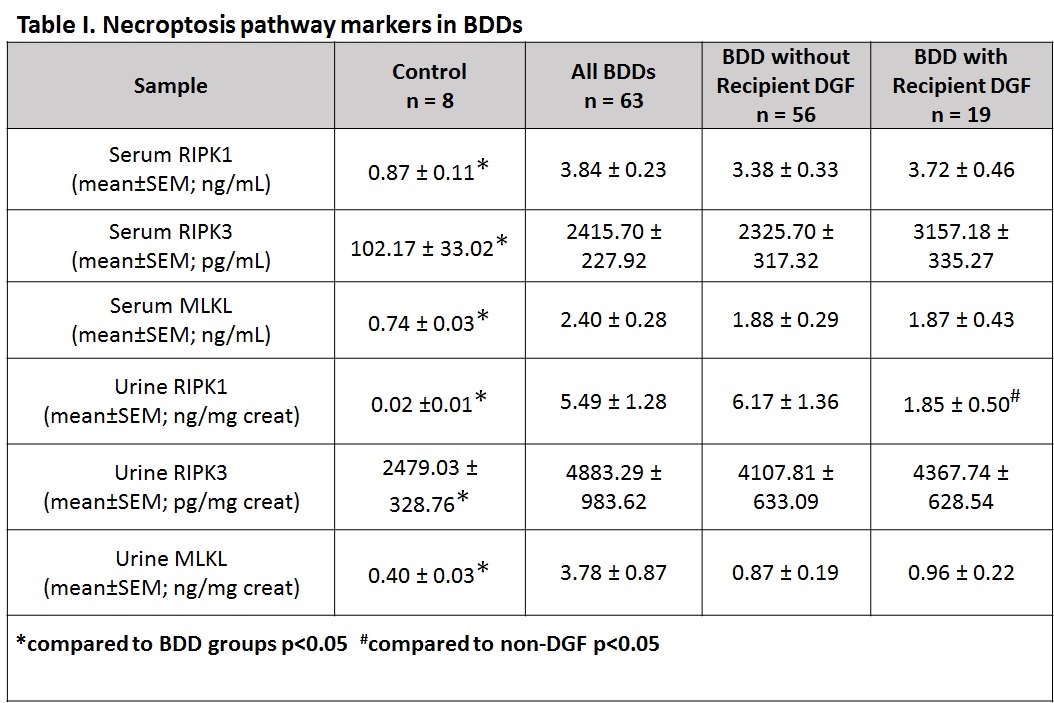Innate Immunity in Brain Dead Donors: Implications of Necroptosis in Kidney Allograft Outcomes
1School of Medicine, UAB, Birmingham, AL, 2Medicine/Nephrology, UAB, Birmingham, AL, 3Pathology, UAB, Birmingham, AL
Meeting: 2019 American Transplant Congress
Abstract number: D261
Keywords: Brain death, Graft function, Ischemia, Necrosis
Session Information
Session Name: Poster Session D: Non-Organ Specific:Organ Preservation/Ischemia Reperfusion Injury
Session Type: Poster Session
Date: Tuesday, June 4, 2019
Session Time: 6:00pm-7:00pm
 Presentation Time: 6:00pm-7:00pm
Presentation Time: 6:00pm-7:00pm
Location: Hall C & D
*Purpose: Regulated necrosis (necroptosis) has been implicated in renal injury from nephrotoxic agents and ischemia. With the use of suboptimal brain dead donors (BDDs) to expand the source of transplantable organs, the rate of delayed graft function (DGF), with higher risks of graft loss and rejection, continues to be a challenge. There are no validated biomarkers predictive of DGF that could guide donor management and improve recipient outcomes. The goal of this study was to determine if detection of necroptotic tissue injury in BDDs could predict DGF in kidney transplant recipients.
*Methods: Urine and serum samples collected from BDDs immediately prior to organ procurement were assayed for necroptotic pathway receptor-interacting protein kinase 1 (RIPK1), receptor-interacting protein kinase 3 (RIPK3), and mixed lineage kinase domain-like protein (MLKL) by ELISA. These results were compared to normal individuals and correlated to donor and recipient demographics and recipient outcomes.
*Results: There were 63 BDDs, with 75 kidneys transplanted locally. 19 recipients (25.3%) developed DGF. In BDDs, serum RIPK1, RIPK3, and MLKL were significantly elevated compared to control individuals (p<0.05). Similarly, urine levels of RIPK1 and RIPK3 were highly elevated compared to normal individuals (control) (p<0.05). However, these proteins did not discriminate the development of DGF in recipients.
*Conclusions: Although RIPK1, RIPK3, and MLKL were strongly associated with inflammation and tissue injury after brain death, they could not distinguish the subsequent development of DGF in this small sample size. Further studies are underway in our expanded donor biorepository. Disruption of the necroptosis pathway may limit organ injury following brain death and improve the suitability of organs for transplantation.
To cite this abstract in AMA style:
Ang A, Zmijewska A, Stevens TM, Murphy J, Mannon RB. Innate Immunity in Brain Dead Donors: Implications of Necroptosis in Kidney Allograft Outcomes [abstract]. Am J Transplant. 2019; 19 (suppl 3). https://atcmeetingabstracts.com/abstract/innate-immunity-in-brain-dead-donors-implications-of-necroptosis-in-kidney-allograft-outcomes/. Accessed February 27, 2026.« Back to 2019 American Transplant Congress

